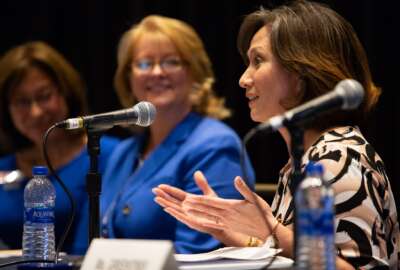

The Army is looking at new steps to boost military spouse employment, potentially including new authorities to hire them as civilian employees.
In an executive order earlier this month, the president ordered federal agencies to step up their hiring of military spouses, mostly by using authorities they already have to prioritize them as job candidates.
But the Army may attempt to go further than that, and seek changes that would let it help solve the unemployment problem by hiring more of those spouses itself.
Mark Esper, the Army secretary, told Congress last week that it currently takes the government an average of 140 days to process employment applications for soldiers’ spouses. That’s a particular problem for families who have to relocate every two or three years, then start the cycle all over again.
“[The wait] is unacceptably high, and I’ve undertaken a series of initiatives that I can control myself within the Army to reduce the hiring time,” he told the Senate appropriations committee. “There are some things that I will eventually elevate to DoD. But then there are some things that I cannot fix, because it’s resident in [the Office of Personnel Management] and how OPM does it. So if it were possible to move that hiring authority either to DoD or the Department of the Army, we would be able to really accelerate our ability to hire spouses and civilians at large.”
According to a new report by the Council of Economic Advisors, military spouses are far less likely to be employed than demographically-comparable segments of the general population, and those that do work earn significantly less than the rest of the American labor force, despite having, on average, higher education levels.
The council, which based its findings mostly on Census data, found that 40 percent of military spouses have a college degree, compared to 30 percent in the rest of the working-age U.S. population. But only 57 percent of them are active labor market participants, compared to 76 percent for the rest of the country.
“Differences in age, sex, race, and ethnicity, cannot account for the gap between military spouses and their peers,” according to the report. “Indeed, accounting for these differences raises the labor force participation gap. And because labor force participation rises with education, controlling for education further increases the gap between participation for military spouses and what would be expected given their demographics.”
The CEA also cited a separate DoD study — largely confirmed by its own analysis of Census data — which found military spouses earn an average of $17,000 less per year than other demographically-similar workers in the broader U.S. economy. Even excluding part-time workers, the council found military spouses who work full-time suffer a 3.4 percent “earnings penalty” by virtue of frequent moves.
Gen. Mark Milley, the Army’s chief of staff, said the service is considering other policy changes that might have an impact on those figures, including by cutting down on the number of moves a military family might have to make during the course of a career.
“That’s a challenge for the Army, but that is probably the biggest impediment to stabilizing spousal employment in a local area,” he said. The constant churn of two or three year reassignments works against spousal employment. It’s very difficult. In the enlisted force, we think we can probably achieve longer than three year assignments. For the officers, it’s significantly more challenging because of the career development opportunities that we want for our officers.”
Copyright © 2024 Federal News Network. All rights reserved. This website is not intended for users located within the European Economic Area.
Jared Serbu is deputy editor of Federal News Network and reports on the Defense Department’s contracting, legislative, workforce and IT issues.
Follow @jserbuWFED

